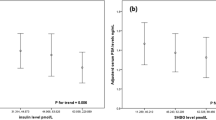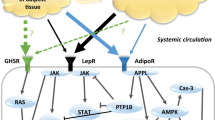Abstract
Recent studies indicate that adipose tissue and adipocytokines might affect the development of prostate cancer (PCa). Leptin would have a stimulating effect on prostate cancer cells by inducing promotion and progression, whereas adiponectin would have a protective effect. The aim of this study was to determine the relation between body composition, leptin, and adiponectin levels with the prevalence and aggressiveness of PCa in men of Mendoza, Argentina. Seventy volunteers between 50 and 80 years (35 healthy men as control group and 35 with PCa) were selected. The PCa group was subclassified according to the Gleason Score (GS). Digital rectal examination, transrectal ultrasound, and prostatic biopsy were performed; PSA, testosterone, leptin, and adiponectin levels were determined; and a nutritional interview including anthropometric measurements and a food frequency questionnaire was carried out. Statistical analysis was performed by Student t test, ANOVA I, and Bonferroni (p < 0.05). Body mass index and percentage of body fat mass were not statistically different between PCa and control groups. However, body fat mass was higher in subjects with more aggressive tumors (p = 0.032). No differences were observed regarding leptin levels between the groups. Nevertheless, leptin levels were higher in subjects with high GS (p < 0.001). Adiponectin levels showed no statistical differences regarding the presence and aggressiveness of the tumor (p = 0.131). Finally, consumption and nutrient intake did not differ in the studied groups. In conclusion, body composition and leptin are related to the PCa aggressiveness but not with its prevalence.

Similar content being viewed by others
References
Amling CL (2005) Relationship between obesity and prostate cancer. Curr Opin Urol 15:167–171
Amling CL, Kane CJ, Riffenburgh RH, Ward JF, Roberts JL, Lance RS, Friedrichs PA, Moul JW (2001) Relationship between obesity and race in predicting adverse pathologic variables in patients undergoing radical prostatectomy. Urology 58:723–728
Amling CL, Riffenburgh RH, Sun L, Moul JW, Lance RS, Kusuda L, Sexton WJ, Soderdahl DW, Donahue TF, Foley JP, Chung AK, McLeod DG (2004) Pathologic variables and recurrence rates as related to obesity and race in men with prostate cancer undergoing radical prostatectomy. J Clin Oncol 22:439–445
Andersson SO, Wolk A, Bergstrom R, Adami HO, Engholm G, Englund A, Nyrén O (1997) Body size and prostate cancer: a 20-year follow-up study among 135,006 Swedish construction workers. J Natl Cancer Inst 89:385–389
Baillargeon J, Platz EA, Rose DP, Pollock BH, Ankerst DP, Haffner S, Higgins B, Lokshin A, Troyer D, Hernandez J, Lynch S, Leach RJ, Thompson IM (2006) Obesity, adipokines, and prostate cancer in a prospective population-based study. Cancer Epidemiol Biomark Prev 15:1331–1335
Baillargeon J, Rose DP (2006) Obesity, adipokines, and prostate cancer. Int J Oncol 28:737–745
Bub Jd, Mitasaki T, Iwamoto Y (2006) Adiponectin as a growth inhibitor in prostate cancer cells. Biochem Biophys Res Commun 340:1158–1166
Buschemeyer WC, Freedland SJ (2007) Obesity and prostate cancer: epidemiology and clinical implications. Eur Urol 52:331–343
Calle EE, Rodriguez C, Walker-Thurmond K, Thun MJ (2003) Overweight, obesity, and mortality from cancer in a prospectively studied cohort of US adults. N Engl J Med 348:1625–1638
Chang S, Hursting SD, Contois JH, Strom SS, Yamamura Y, Babaian RJ, Troncoso P, Scardino PS, Wheeler TM, Amos CI, Spitz MR (2001) Leptin and prostate cancer. Prostate 46:62–67
Chasan-Taber S, Rimm EB, Stampfer MJ, Spiegelman D, Colditz GA, Giovannucci E (1996) Reproducibility and validity of a self-administered physical activity questionnaire for male health professionals. Epidemiology 7:81–86
Ford ES, Mokdad AH, Giles WH, Galuska DA, Serdula MK (2003) Geographic variation in the prevalence of obesity, diabetes and obesity related behaviours. Obes Res 13:118–122
Foss B, Mentzoni L, Bruserud O (2001) Effects of vascular endothelial growth factor on acute myelogenous leukaemia blasts. J Hematother Stem Cell Res 10:81–93
Freedland SJ, Aronson WJ, Kane CJ, Terris MK, Presti JC Jr, Trock B, Amling CL (2004) Impact of obesity on biochemical control after radical prostatectomy for clinically localized prostate cancer: a report by the Shared Equal Access Regional Cancer Hospital database study group. J Clin Oncol 22:446–453
Freedland SJ, Platz EA (2007) Obesity and prostate cancer: making sense out of apparently conflicting data. Epidemiol Rev 29:88–97
Freedland SJ, Sokoll LJ, Mangold LA, Bruzek DJ, Mohr P, Yiu SK, Epstein JI, Partin AW (2005) Serum leptin and pathological findings at the time of radical prostatectomy. J Urol 173:773–776
Gibson RS (2005) Principles of nutritional assessment, 2nd edn. Oxford University Press, New York, N.Y
Hebert JR, Miller DR (1988) Methodologic considerations for investigating the diet-cancer link. Am J Clin Nutr 47:1068–1077
Hirayama T (1979) Epidemiology of prostate cancer with special reference to the role of diet. Natl Cancer Inst Monogr 149–155
Housa D, Housová J, Vernerová Z, Haluzík M (2006) Adipocytokines and cancer. Physiol Res 55:233–244
Hsing AW, Deng J, Sesterhenn IA, Mostofi FK, Stanczyk FZ, Benichou J, Xie T, Gao YT (2000) Body size and prostate cancer: a population-based case-control study in China. Cancer Epidemiol Biomark Prev 9:1335–1341
Hsing AW, McLaughlin JK, Schuman LM et al (1990) Diet, tobacco use, and fatal prostate cancer: results from the Lutheran Brotherhood Cohort Study. Cancer Res 50:6836–6840
Hsing AW, Sakoda LC, Chua S Jr (2007) Obesity, metabolic syndrome, and prostate cancer. Am J Clin Nutr 86:s843–s857
Kelesidis I, Kelesidis T, Mantzoros CS (2006) Adiponectin and cancer: systematic review. Br J Cancer 94:1221–1225
Kolonel LN, Nomura AM, Cooney RV (1999) Dietary fat and prostate cancer: current status. J Natl Cancer Inst 91:414–428
Krotkiewski M, Bjorntorp P, Sjostrom L, Smith U (1983) Impact of obesity on metabolism in men and women: importance of regional adipose tissue distribution. J Clin Invest 72:1150–1162
López FC, Di Milta N, Maselli ME, Recalde GM, Vanrell MC, Pérez ER, López Laur JD (2009) The rol of leptin and adiponectin on prostate cancer. Arch Esp Urol 62:103–108
López Fontana CM, Recalde Rincón GM, Messina Lombino D, Uvilla Recupero AL, Pérez Elizalde RF, López Laur JD (2009) El índice de masa corporal y la dieta afectan el desarrollo del cáncer de próstata. Actas Urol Esp 33(7):741–746
Luo XH, Lj G, Yuan LQ, Xie H, Zhou HD, Wu XP, Liao EY (2005) Adiponectin stimulates human osteoblasts proliferation and differentiation via the MAPK signaling pathway. Exp Cell Res 309:99–109
Magheli A, Rais-Bahrami S, Trock BJ, Humphreys EB, Partin AW, Han M, Gonzalgo ML (2008) Impact of body mass index on biochemical recurrence rates after radical prostatectomy: an analysis utilizing propensity score matching. Urology 72:1246–1251
Meyer F, Bairati I, Shadmani R, Fradet Y, Moore L (1999) Dietary fat and prostate cancer survival. Cancer Causes Control 10:245–251
Mills PK, Beeson WL, Phillips RL, Fraser GE (1989) Cohort study of diet, lifestyle, and prostate cancer in Adventist men. Cancer 64:598–604
Mistry T, Digby J, Desai K, Randeva H (2007) Obesity and prostate cancer: a role for Adipokines. Eur Urol 52:46–53
Moreno JC, Martínez JA (2002) Tejido adiposo: órgano de almacenamiento y órgano secretor. An Sist Sanit Navar 25:29–39
Moyad MA (2002) Dietary fat reduction to reduce prostate cancer risk: controlled enthusiasm, learning a lesson from breast or other cancers, and the big picture. Urology 59(4 suppl 1):51–62
Mydlo JH, Tieng NL, Volpe MA, Chaiken R, Kral JG (2001) A pilot study analyzing PSA, serum testosterone, lipid profile, body mass index and race in a small sample of patients with and without carcinoma of the prostate. Prostate Cancer Prostatic Dis 4:101–105
Nandeesha H, Koner BC, Dorairajan LN (2008) Altered insulin sensitivity, insulin secretion and lipid profile in non-diabetic prostate carcinoma. Acta Physiol Hung 95:97–105
Nishida M, Funahashi T, Shimomura I (2007) Pathophysiological significance of adiponectin. Med Mol Morphol 40(2):55–67
Presti JC (2005) Obesity and prostate cancer. Curr Opin Urol 15:13–16
Rodriguez C, Patel AV, Calle EE, Jacobs EJ, Chao A, Thun MJ (2001) Body mass index, height, and prostate cancer mortality in two large cohorts of adult men in the United States. Cancer Epidemiol Biomark Prev 10:345–353
Rohrmann S, Roberts WW, Walsh PC, Platz EA (2003) Family history of prostate cancer and obesity in relation to high-grade disease and extraprostatic extension in young men with prostate cancer. Prostate 55:140–146
Saglam D, Aydur E, Yilmaz I, Goktas S (2003) Leptin influences cellurar differentiation and progression in prostate cancer. J Urol 169:1308–1311
Satia-About AJ, Patterson RE, Schiller RN, Kristal AR (2002) Energy from fat is associated with obesity in US men: results from the Prostate Cancer prevention trial. Prev Med 34:493–501
Schuurman AG, van den Brandt PA, Dorant E et al (1999) Association of energy and fat intake with prostate carcinoma risk: results from The Netherlands Cohort Study. Cancer 86:1019–1027
Severson RK, Nomura AM, Grove JS, Stemmermann GN (1989) A prospective study of demographics, diet, and prostate cancer among men of Japanese ancestry in Hawaii. Cancer Res 49:1857–1860
Snowdon DA, Phillips RL, Choi W (1984) Diet, obesity, and risk of fatal prostate cancer. Am J Epidemiol 120:244–250
Stattin P, Soderberg S, Hallmans G, Bylund A, Kaaks R, Stenman UH, Bergh A, Olsson T (2001) Leptin is associated with increase prostate cancer risk: a nested case-referent study. J Clin Endocrinol Metab 86:1341–1345
West DW, Slattery ML, Robison LM, French TK, Mahoney AW (1991) Adult dietary intake and prostate cancer risk in Utah: a case-control study with special emphasis on aggressive tumors. Cancer Causes Control 2:85–94
Wilkens LR, Hankin JH, Yoshizawa CN et al (1992) Comparison of long-term dietary recall between cancer cases and noncases. Am J Epidemiol 136:825–835
Wolf AM, Hunter DJ, Colditz GA, Manson JE, Stampfer MJ, Corsano KA et al (1994) Reproducibility and validity of a self-administered physical activity questionnaire. Int J Epidemiol 23:991–999
World Health Organization (1998) Obesity, preventing and managing the global epidemia: report of the WHO consulation on Obesity World Health Organization, Genova
Acknowledgments
We are deeply indebted to Diego Messina, Cristina Vanrell, and Gabriela Recalde for their excellent technical assistance. The research was financially supported in part by Universidad Juan Agustin Maza and by Fundación Allende.
Conflicts of interest
None of the contributing authors has any conflicts of interest, including specific financial interests and relationships and affiliations relevant to the subject matter or materials discussed in the manuscript.
Author information
Authors and Affiliations
Corresponding author
Rights and permissions
About this article
Cite this article
López Fontana, C.M., Maselli, M.E., Pérez Elizalde, R.F. et al. Leptin increases prostate cancer aggressiveness. J Physiol Biochem 67, 531–538 (2011). https://doi.org/10.1007/s13105-011-0098-y
Received:
Accepted:
Published:
Issue Date:
DOI: https://doi.org/10.1007/s13105-011-0098-y




